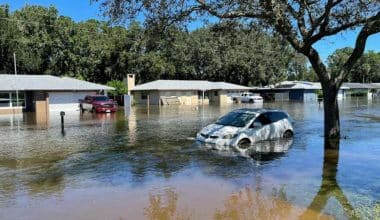Accidents on the job are common and can be costly without the proper coverage. Construction insurance can protect your business from financial liabilities that may arise as a result of unforeseen catastrophes or other circumstances. Adequate coverage could determine a company’s ability to continue operations. This article will explain what construction insurance is, its types, the best construction insurance companies, general liability, and business construction insurance.
Construction Insurance
Construction insurance provides protection for construction companies, general contractors, and property owners from legal actions, property damage, and other financially burdensome responsibilities.
For numerous building and contractor firms, a single insurance policy may prove insufficient. In order to adequately safeguard your business and construction initiatives, it is important to procure a distinct assortment of insurance policies, each tailored to offer specialized forms of protection.
General Liability Construction Insurance
General liability insurance, often known as commercial general liability (CGL), safeguards contractors against lawsuits alleging that their work caused third-party injuries or property damage.
The danger of harm or property damage to third parties is considerable in the construction industry since the work performed is often sophisticated, challenging, and risky. In these cases, a general liability policy can shield contractors from financial ruin by covering the costs of legal defence and any settlements that may arise.
The financial burden of even a single lawsuit is too much for most construction organizations to bear; hence, general liability insurance is employed by virtually all contracting businesses. Thus, general liability insurance is considered a kind of risk transfer because it transfers the contractor’s exposure to claims of physical injury and property damage to the insurance company.
What Does General Liability Insurance Cover?
General liability insurance covers the majority of claims made against contractors in the instances listed below.
- Bodily injury: If a customer or other third party is injured as a result of your work (for example, tripping over some wiring), they may sue, and general liability insurance will cover court fees and any settlements up to the limits of your coverage.
- Property damage: While executing work, you may inadvertently cause damage to a client’s property (such as furniture, plasterboard, or flooring), and general liability insurance would assist in recovering the cost of damages.
- Personal and advertising injuries, including slander and libel: You could inadvertently injure another business through advertising, libel, or slander, and a general liability policy can help pay for the other business’s damages.
A general liability insurance policy will pay attorney expenses, court fees, and settlements up to the coverage level for each of these categories.
General liability plans feature coverage limits that apply both per incident and in aggregate. A common general liability policy for small and medium-sized contracting businesses, for instance, will have limits of $1 million / $2 million, which means that each incident is covered up to $1 million and the annual policy covers a total of $2 million for all claims combined.
Depending on the specific requirements of a business, a number of policies offer the option to add endorsements or coverage. Mobile equipment, data intrusions, and reputation repair are examples of common add-on coverages that many construction companies choose to include in their general liability policies.
Read Also: HOMEOWNERS INSURANCE FOR NEW CONSTRUCTION
Types of Construction Insurance
As the owner or project manager of a construction company, you should consider the following types of construction insurance for your company:
#1. Workers’ Compensation Insurance
This insurance covers medical expenses and wage loss for your employees who are injured or ill on the job. Workers’ compensation insurance is required in most states for every construction company or contractor with at least one employee.
The construction industry is physically demanding and fraught with injury risks. If you or one of your employees were injured on the job and you did not have workers’ compensation coverage, you might be held liable for the medical bills and lost earnings.
Workers’ compensation insurance safeguards you, your company, and your employees by covering these costs. Furthermore, most workers’ compensation policies contain employer liability insurance, which can assist in paying for employee lawsuits if a worker claims that unsafe working conditions caused their bodily damage.
#2. Commercial Auto Insurance
An automobile accident can be exceedingly costly, particularly if another person is harmed. If one of your company’s vehicles is involved in an accident, commercial auto insurance coverage will cover medical bills, legal fees, and property damage. Trucks and other vehicles often used in construction projects are included.
Most states require construction companies and contractors to have commercial auto insurance for company-owned vehicles, but the amount of coverage required varies. It’s advisable to have adequate coverage to match your state’s standards as well as the amount you could expect to pay in the event of an accident.
#3. Builder’s Risk Insurance
Builder’s risk insurance is one of the types of construction insurance that pays for damage to a building or structure while it is still being built. Possible causes of the damage include:
- Vandalism
- Fire
- Weather
Other types of construction insurance cover equipment and workers, but most do not cover an unfinished structure. Builder’s risk policies address that void, ensuring that your company isn’t forced to pay for damaged or wrecked building materials before the project is even completed.
A builder’s risk insurance coverage gives you and your clients peace of mind, making it an excellent complement to your construction and contractor insurance packages.
#4. Contractor’s Tools and Equipment Insurance
If your tools are stolen, lost, or damaged, fixing or replacing them might cost your company thousands of dollars. Fortunately, the contractor’s tools and equipment insurance covers the cost of repairing or replacing qualified equipment.
This policy often covers a wide range of items and equipment that are less than five years old, such as hand tools (saws, wrenches, and hammers) and power tools (drills, nail guns, and circular saws). If you need to file a claim for tools that have been lost, stolen, or damaged, your insurance carrier will cover the cost of repairing or replacing them up to the limits of your policy.
The limit on this coverage is frequently $10,000 for business insurance. In order to protect more valued property, such as excavators or forklifts, inland marine insurance may be required.
In contrast to commercial property insurance, which covers a structure you own and its contents, both policies only cover transportable equipment carried to job sites.
#5. Professional Liability Insurance
Professional liability insurance, often known as errors and omissions insurance (E&O), protects your construction company against claims based on the quality of your work or the work of subcontractors you have hired.
When you sign a contract with a client, you agree to produce a specific level of work within a specific time frame. Your client may sue you if your company fails to meet the deadline or quality standards for the building project.
Professional liability insurance covers the costs of any lawsuits emerging from the quality of your work, including lawyer fees, court fees, and settlements, regardless of culpability.
#6. General Liability Insurance
General liability insurance protects construction companies from common dangers. These dangers include:
- Property damage caused by a third party
- bodily injury to a third party
- Copyright violations and other advertising damages
- Damages resulting from your finished construction or installation
If one of these occurrences occurred at your workplace, your business general liability policy would cover any medical claims as well as any property repair or replacement costs.
Read Also: PLUMBING INSURANCE: What Is It & Who Needs It?
Construction Insurance Companies
Construction workers encounter a variety of hazards, ranging from on-the-job injuries and equipment theft to schedule delays and consumer lawsuits. Business insurance protects your firm financially if something goes wrong on the job or at your shop.
The top construction insurance companies have customizable policies, allowing you to receive the correct coverage for your trade, work types, and firm size. They also provide convenience by allowing you to receive quotations and file claims at your own pace.
These insurance carriers provide customized coverage for construction companies and have good financial ratings from AM Best, a reputable credit rating agency specializing in the insurance industry. This list contains some construction insurance companies.
#1. Erie: Best overall customer satisfaction
Pros:
- In J.D. Power’s 2021 U.S. small commercial insurance research, they were rated among the top providers for overall customer satisfaction.
- They have agents who speak multiple languages.
Cons:
Only 12 states and Washington, D.C., have coverage.
What to enjoy about it: Contractor’s insurance from Erie includes general liability and commercial property insurance, but you may customize your policy with builders risk insurance, tools and equipment coverage, workers’ compensation, and commercial auto (among other coverages) based on your insurance needs. Local agents can provide quotes, and non-native English speakers can look for agents who speak their preferred language. Erie also has an A+ rating with the Better Business Bureau.
#2. Nationwide: Best for Customized Coverage
Pros:
- Construction-specific coverage and risk-management services are available.
- Quotes can be obtained online.
Cons:
According to J.D. Power’s 2021 U.S. small commercial insurance report, client satisfaction is below average.
What to enjoy about it: Nationwide provides specialized construction coverage, such as inland marine insurance, builder’s risk coverage, and surety and fidelity bonds. You can begin a quotation online, over the phone, or in person with an agent. Furthermore, Nationwide has an A+ rating with the Better Business Bureau.
Read Also: ENGINEER PROFESSIONAL LIABILITY INSURANCE: 2023 Guide
Best Construction Insurance Companies
The following are the best construction insurance companies:
#1. The Hartford: Best for Construction-Industry Expertise
Pros:
- Business income insurance is included in a business owner’s policy.
- Underwriters that specialize in the construction industry.
- Risk engineering specialists can assist your company in minimizing losses.
- There are online quotes accessible.
Cons:
- According to J.D. Power’s 2021 U.S. small commercial insurance report, client satisfaction is below average.
- Coverage is not accessible in Alaska, Hawaii, or New Jersey.
What to enjoy about it: Hartford’s business owner’s policies cover business interruption costs if property damage forces a shutdown. This is not the norm for all commercial insurance carriers. Furthermore, you can combine coverage to include, among other things, workers’ compensation, management liability, and installation coverage. Although you can acquire a quote online, all insurance is marketed through agents.
#2. Next: Best for Online Quotes, Claims
Pros:
- Get a quote and buy your policy online.
- Claims are frequently settled within 48 hours.
Cons:
- A newer insurance company (established in 2016).
- Some types of specialty construction coverage are not accessible.
- There is no coverage in New York or Washington, DC.
What to enjoy about it: Next is a new player in a market where established businesses predominate. Nonetheless, the organization has already received an A+ rating from the Better Business Bureau. With Next, you may conduct your business insurance totally online, from quotations to claims, or you can call an agent. Next provides general and professional liability insurance, as well as workers’ compensation, commercial auto insurance, and tools and equipment insurance. Next, on the other hand, does not provide specialized coverage such as builder’s risk or pollution liability insurance.
What Is the Full Meaning of Construction?
- The method, art, or way of constructing
- Something made or put together: structure.
- The placement and relation of words or groups of words in a phrase.
How Are Construction Work Insured?
General liability insurance is the most fundamental and necessary type of coverage for any construction project. It protects you against bodily harm or property damage caused by you or your subcontractors to third parties such as clients, visitors, or neighbors.
What Is Coc in Construction?
The course of Construction (COC) Insurance, often known as Builder’s Risk Insurance, covers a building or renovation against harm.. It often protects the contractor and builder from any damage to the structure, machinery, or supplies.
What Are the 4 Types of Construction?
The four major categories of construction are residential construction, commercial construction, industrial construction, and infrastructure building.
Why Is Insurance Important in a Project?
Natural catastrophes, theft, and other unforeseen occurrences can all wreak havoc on a construction project. If these disasters occur, you will need insurance to cover your project. The three most frequent calamities covered by builders’ risk insurance are fire, weather, and vandalism.
How Do You Insure a Project?
Traditional construction project insurance requires the owner, general contractor, and each subcontractor to acquire their own insurance. One party, typically the owner, purchases wrap-up insurance in order to protect both the owner and the numerous contractors.






